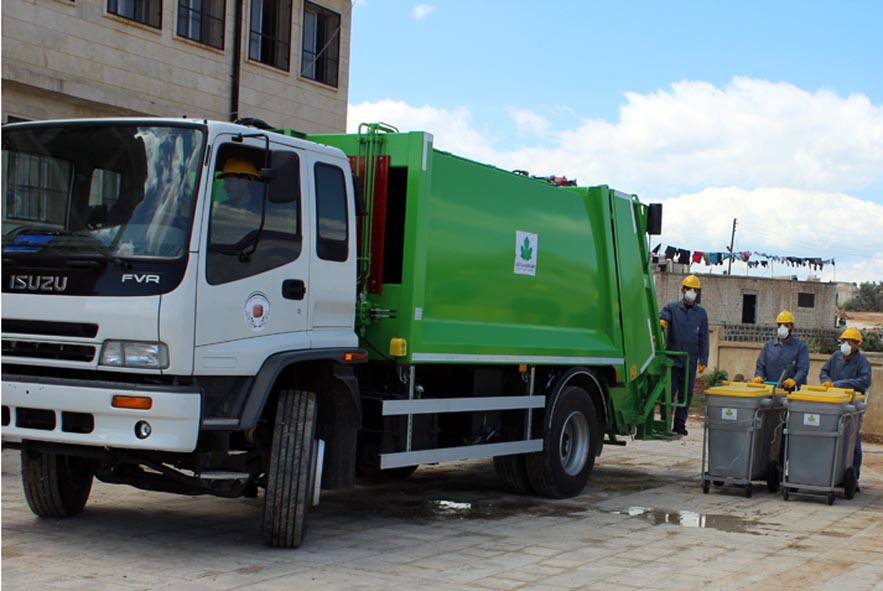Cleaning Up Kfar Nabel

Abu Adel used to live right next to Kfar Nabel’s main landfill site.
“The smell was unbearable, and an invasion of insects had settled in the area,” the 53 year-old told Damascus Bureau. “Several of my neighbours contracted skin diseases, including leishmaniasis.”
After complaints to Kfar Nabel’s local council over the increasing health hazards the landfill presented, it was moved to the outskirts of the city.
Abu Adel’s life – and those of his neighbours – immediately improved.
“When the landfill was relocated and its remains were covered, the smell and the insects disappeared,” he said.
The relocation project began on January 17, 2015, in collaboration with the Polish Humanitarian Association (PAH).
“We approached a number of aid agencies and explained that Kfar Nabel’s random pattern of urban expansion meant that a number of residential areas were very close to the old landfill,” said project head Saeed al-Mirsal.
“We requested support to move it to the outskirts of the city, and the PAH promised to fund the project.”
The old rubbish dump was demolished and covered with soil, and a new 30,000 metre square site prepared in the outskirts of the city.

The ground was levelled, covered it with a layer of sand and walled off.
Kfar Nabel’s council now transports rubbish from across the city to this new site.
“We collect rubbish from street containers and load it into our trucks which compress it,” said council worker Abu Mohammed.
“We then transport the waste to the new site and burn it.”
Abu Mohammed said that waste was not burned on a daily basis, and recommended that the council regularly sprayed insecticide in and around the landfill.
He also said a large bulldozer was needed to pile up the burnt remains.
Abdalla al-Haj, head of the council’s service department, agreed that more remained to be done.
“The project was a very wise move, but the method we use to dispose of the collected waste releases toxic fumes,” the 33 year-old said, adding that he wanted to find a more environmentally friendly way to dispose of the waste.
Mahmoud al-Khatib, head of the council’s foreign relations department, told Damascus Bureau he was seeking funding for an incineration facility.
“We have written a proposal that explains the benefits of building a waste and recycling factory in Kfar Nabel,” the 36 year-old said.
“However, we still haven’t managed to secure funding as the costs are very high.”
Al-Khatib said that all of Idlib’s southern countryside and Hama’s northern countryside would benefit from such provision.
In the meantime, Kfar Nabel’s local council has called for residents to play their part in keeping the streets clean.
“Lack of hygiene leaves the city prone to insect and rodent infestations,” 35 year-old environmental engineer Abdel Razzaq al-Humud told Damascus Bureau.
“Sanitation is the best way to prevent soil, water, and air pollution, and also prevent the spread of diseases.”
Head of Kafr Nabel’s local council Ayman Klidu said the council had teamed up with the Syria programme of Chemonics, an international development company, to roll out an extensive street sanitation programme.
“We have bought small carts, brooms and clothes for a group of workers who now clean the streets,” he said.
“Chemonics funded their wages for three months, but residents need to comply with rubbish collection timetables and they must pay the associated fees so we can continue to keep our streets clean.”
Mostafa al-Jalal is the pseudonym of a Damascus Bureau contributor from Kfar Nabel, Syria.
Read the Arabic version of this article here
